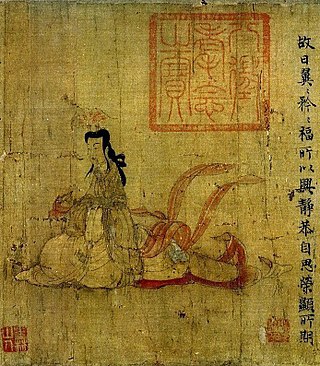Related Research Articles

Learning theory describes how students receive, process, and retain knowledge during learning. Cognitive, emotional, and environmental influences, as well as prior experience, all play a part in how understanding, or a worldview, is acquired or changed and knowledge and skills retained.
Critical thinking is the process of analyzing available facts, evidence, observations, and arguments to make sound conclusions or informed choices. It involves recognizing underlying assumptions, providing justifications for ideas and actions, evaluating these justifications through comparisons with varying perspectives, and assessing their rationality and potential consequences. The goal of critical thinking is to form a judgment through the application of rational, skeptical, and unbiased analyses and evaluation. In modern times, the use of the phrase critical thinking can be traced to John Dewey, who used the phrase reflective thinking, which depends on the knowledge base of an individual; the excellence of critical thinking in which an individual can engage varies according to it. According to philosopher Richard W. Paul, critical thinking and analysis are competencies that can be learned or trained. The application of critical thinking includes self-directed, self-disciplined, self-monitored, and self-corrective habits of the mind, as critical thinking is not a natural process; it must be induced, and ownership of the process must be taken for successful questioning and reasoning. Critical thinking presupposes a rigorous commitment to overcome egocentrism and sociocentrism, that leads to a mindful command of effective communication and problem solving.
Transformative learning, as a theory, says that the process of "perspective transformation" has three dimensions: psychological, convictional, and behavioral.
Transformative learning is the expansion of consciousness through the transformation of basic worldview and specific capacities of the self; transformative learning is facilitated through consciously directed processes such as appreciatively accessing and receiving the symbolic contents of the unconscious and critically analyzing underlying premises.
Experiential education is a philosophy of education that describes the process that occurs between a teacher and student that infuses direct experience with the learning environment and content. This concept is distinct from experiential learning, however experiential learning is a subfield and operates under the methodologies associated with experiential education. The Association for Experiential Education regards experiential education as "a philosophy that informs many methodologies in which educators purposefully engage with learners in direct experience and focused reflection in order to increase knowledge, develop skills, clarify values, and develop people's capacity to contribute to their communities". The Journal of Experiential Education publishes peer-reviewed empirical and theoretical academic research within the field.

Experiential learning (ExL) is the process of learning through experience, and is more narrowly defined as "learning through reflection on doing". Hands-on learning can be a form of experiential learning, but does not necessarily involve students reflecting on their product. Experiential learning is distinct from rote or didactic learning, in which the learner plays a comparatively passive role. It is related to, but not synonymous with, other forms of active learning such as action learning, adventure learning, free-choice learning, cooperative learning, service-learning, and situated learning.

An athletic coach is a person coaching in sport, involved in the direction, instruction, and training of a sports team or athlete.
Situated cognition is a theory that posits that knowing is inseparable from doing by arguing that all knowledge is situated in activity bound to social, cultural and physical contexts.
Learning styles refer to a range of theories that aim to account for differences in individuals' learning. Although there is ample evidence that individuals express personal preferences on how they prefer to receive information, few studies have found validity in using learning styles in education. Many theories share the proposition that humans can be classified according to their "style" of learning, but differ on how the proposed styles should be defined, categorized and assessed. A common concept is that individuals differ in how they learn.

Andragogy refers to methods and principles used in adult education. The word comes from the Greek ἀνδρ- (andr-), meaning "adult male", and ἀγωγός (agogos), meaning "leader of". Therefore, andragogy literally means "leading men ", whereas "pedagogy" literally means "leading children".

Self-reflection is the ability to witness and evaluate one's own cognitive, emotional, and behavioural processes. In psychology, other terms used for this self-observation include "reflective awareness" and "reflective consciousness", which originate from the work of William James.

Donald Alan Schön was an American philosopher and professor in urban planning at the Massachusetts Institute of Technology. He developed the concept of reflective practice and contributed to the theory of organizational learning.
A learning cycle is a concept of how people learn from experience. A learning cycle will have a number of stages or phases, the last of which can be followed by the first.
Reflective practice is the ability to reflect on one's actions so as to take a critical stance or attitude towards one's own practice and that of one's peers, engaging in a process of continuous adaptation and learning. According to one definition it involves "paying critical attention to the practical values and theories which inform everyday actions, by examining practice reflectively and reflexively. This leads to developmental insight". A key rationale for reflective practice is that experience alone does not necessarily lead to learning; deliberate reflection on experience is essential.
Robert Kegan is an American developmental psychologist. He is a licensed psychologist and practicing therapist, lectures to professional and lay audiences, and consults in the area of professional development and organization development.
Practice-based professional learning (PBPL) is understood in contrast to classroom- or theory-based learning. It is kindred to terms such as work-based learning, workplace or work-centred learning. Distinctive, though, are a concern for professional learning, and the preference for practice rather than work. While it does not disdain propositional knowledge and what is sometimes called theory, its prime interest is in the formation of self-renewing and effective professional practices—a distinct theoretical position in its own right.

Reflective writing is an analytical practice in which the writer describes a real or imaginary scene, event, interaction, passing thought, or memory and adds a personal reflection on its meaning. Many reflective writers keep in mind questions such as "What did I notice?", "How has this changed me?" or "What might I have done differently?" when reflecting.
Archetypal pedagogy is a theory of education developed by Clifford Mayes that aims at enhancing psycho-spiritual growth in both the teacher and student. The idea of archetypal pedagogy stems from the Jungian tradition and is directly related to analytical psychology.
Multiliteracy is an approach to literacy theory and pedagogy coined in the mid-1990s by the New London Group. The approach is characterized by two key aspects of literacy – linguistic diversity and multimodal forms of linguistic expressions and representation. It was coined in response to two major changes in the globalized environment. One such change was the growing linguistic and cultural diversity due to increased transnational migration. The second major change was the proliferation of new mediums of communication due to advancement in communication technologies e.g. the internet, multimedia, and digital media. As a scholarly approach, multiliteracy focuses on the new "literacy" that is developing in response to the changes in the way people communicate globally due to technological shifts and the interplay between different cultures and languages.
One of the most visible approaches to peer learning comes out of cognitive psychology, and is applied within a "mainstream" educational framework: "Peer learning is an educational practice in which students interact with other students to attain educational goals." Other authors including David Boud describe peer learning as a way of moving beyond independent to interdependent or mutual learning among peers. In this context, it can be compared to the practices that go by the name cooperative learning. However, other contemporary views on peer learning relax the constraints, and position "peer-to-peer learning" as a mode of "learning for everyone, by everyone, about almost anything." Whether it takes place in a formal or informal learning context, in small groups or online, peer learning manifests aspects of self-organization that are mostly absent from pedagogical models of teaching and learning.
Coaching psychology is a field of applied psychology that applies psychological theories and concepts to the practice of coaching. Its aim is to increase performance, self-actualization, achievement and well-being in individuals, teams and organisations by utilising evidence-based methods grounded in scientific research. Coaching psychology is influenced by theories in various psychological fields, such as humanistic psychology, positive psychology, learning theory and social psychology.
References
- ↑ Brockbank, Anne; McGill, Ian (2006). Facilitating Reflective Learning Through Mentoring & Coaching . London: Kogan Page Publishers. pp. 27. ISBN 0749444487.
- ↑ Boyd, Evelyn M.; Fales, Ann W. (1983). "Reflective Learning". Journal of Humanistic Psychology. 23 (2): 99–117. doi:10.1177/0022167883232011. ISSN 0022-1678. S2CID 146667190.
- ↑ Boud, David; Keogh, Rosemary; Walker, David, eds. (2013). Reflection. doi:10.4324/9781315059051. ISBN 9781135845469.
- ↑ Rivera Pelayo, Verónica (2015). Design and Application of Quantified Self Approaches for Reflective Learning in the Workplace. KIT Scientific. p. 15. ISBN 9783731504061.
- ↑ Sugerman, Deborah A. (2000). Reflective Learning: Theory and Practice. Kendall Hunt. p. 1. ISBN 9780787265618.
- ↑ Jasper, Melanie (2003). Beginning Reflective Practice . Cheltenham: Nelson Thornes. pp. 1. ISBN 0748771174.[ dead link ]